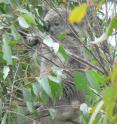Koalas selective about eucalyptus leaves at mealtime
Koala population distribution may be influenced by eucalyptus leaf toxin and nutrient content, especially in areas with low-quality food options, according to a study published December 3, 2014 in the open-access journal PLOS ONE by Eleanor Stalenberg from The Australian National University and colleagues. Scientists suspect that access to nutritious food plays a role in herbivore distribution and abundance, but there is still some debate over how variation in plant nutritional qualities may influence population distribution. Koalas predominantly eat eucalyptus leaves and their population density varies widely in different Australian eucalyptus forests, possibly due to variation in the nutritional quality of the eucalyptus leaves. The authors of this study sampled leaves from eight species of eucalyptus trees in forests on the far south coast of New South Wales, Australia, to investigate how leaf chemistry might influence wild koala distribution. They also measured koala tree visitation using koala faecal pellets at the base of the tree as a proxy.
They found that koalas visited trees with leaves containing higher available nitrogen--used by the body to make proteins--and avoided trees with higher leaf concentrations of a toxic chemical found exclusively in eucalypts when compared with a neighboring tree of the same species. The authors posit that plant diversity is likely important when koalas are foraging in habitats of low nutritional quality, providing a range of nutritional quality and minimizing the need to move to forests with higher quality leaves. The researchers' findings suggest that nutritional limitations play an important role in constraining leaf-eating koala populations.
Source: PLOS
Other sources
- Koalas selective about eucalyptus leaves at mealtime: Koalas selected leaves with more nitrogen, fewer toxinsfrom Science DailyWed, 3 Dec 2014, 22:30:09 UTC
- Koalas selective about eucalyptus leaves at mealtimefrom PhysorgWed, 3 Dec 2014, 19:00:23 UTC
